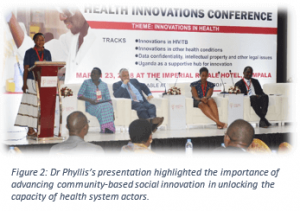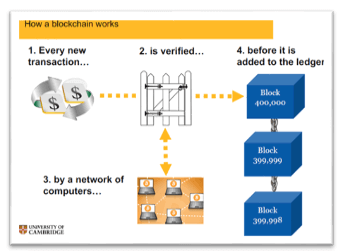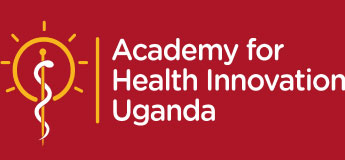
Conference 2018 – Generating ideas for Health Innovation
Background
The Ugandan Academy for Health Innovation and Impact was formed after a memorandum of understanding between the following partners: Ugandan Ministry of Health, Infectious Diseases Institute (IDI), Janssen, the pharmaceutical companies of Johnson & Johnson, and the Johnson & Johnson Corporate Citizenship Trust. The Ugandan Academy’s mission is to improve health outcomes through innovations in clinical care, capacity building, systems strengthening and research, which inform policy and practice, with a strong emphasis on HIV and TB.
It is as part of this mission that The Academy hosted the inaugural health innovations conference. The aim of this report is to identify learning points arising from sharing information about its work through meeting stakeholders who may be interested in our activities, gathering information for the mid-term review of the Academy strategic plan and to align our priorities with national priorities and those of other stakeholders/ funders.
Additionally, after a call for innovative ideas in health in November 2017, the conference was also an opportunity to award the winners of the National Ideas Competition.
The conference, themed “Innovations in Health” had four primary tracks, namely;
1. Innovation in HIV/TB
2. Innovations in other health conditions
3. Data confidentiality and Intellectual property
4. Priority areas for health in innovations
The fourth session, “Priority areas in health” was a panel session with representatives from key players in health systems strengthening.
There was also a riveting session titled “Lightening talks and Poster presentations” where eighteen three-minute presentations were made by both Academy-affiliated organisations and abstract or poster entrants to the conference.
The event took place in Kampala at Imperial Royale Hotel on Friday, March 23rd, 2018 and has substantially opened our perception and understanding of innovations in health.
The outcomes of the conference it is hoped will inform conclusions to be adopted by and the results will also be incorporated in the report on the lessons
Opening remarks of the conference
The opening remarks at the conference were given by Prof. Elly Katabira, a professor of Medicine Makerere University College of Health Sciences who doubles as the board chair of The Ugandan Academy for Health Innovation and Impact. He welcomed everyone who had taken off time to attend the conference and promised a myriad of benefits.
Session 1: Innovations in HIV/TB
Keynote by Wim Parys highlighted that Johnson and Johnson is proud to be associated with the works The Academy is supporting. Improving health to treat HIV and TB necessitates that we combine health science, innovation and ingenuity which are all well aligned with the academy’s vision of sustainable health care accessible to all in Uganda. Testimonies from patients, health care workers as well as government show that the potential to transform and impact patient care exist within The Academy’s ambitions. This, they are doing by driving innovation through local projects while strengthening entrepreneurial leadership in Uganda. These new self-sustainable approaches by focusing on novel research and development models and partnerships to avail affordable and accessible health technology and treatments to harness extensive resources and expertise to provide an end to end solution for both HIV and TB.
Dr Rosalind Parkes-Ratanshi thanked all participants for being a part of the Academy’s inaugural conference which is in line with The Academy’s mission on its own sustainability as well that of healthcare in HIV and TB in Uganda but  expressed hope that the conference would go wider than this scope to other health conditions. She spoke of The Academy’s journey so far, highlighting the original plan to have demonstration projects by Infectious Diseases Institute in research, capacity building and clinical management, with subsequent calls for proposals in the same. The Academy now supports up to 18 projects from the original six and to enable work to carry on on a wider geographic range, 9 organisations have been sub-granted. The innovations that the Academy supports range from simple Tippy Tap solutions in hygiene to the Call for LifeTM technology which while more complex is inclusive to anyone with a simple mobile phone, reminding them to take their medication and report any worrying symptoms to doctors, who then get in touch. The Academy is also proud to have acquired additional research funding in line with sustainability from the UK Medical Research Council to develop a mobile phone and web-based application that will help deliver Antiretroviral drugs in private community health care facilities. While strides are being made to deliver services seamlessly, there are some challenges such as sim-card registrations that have disrupted the mHealth tool. Feedback from beneficiaries, however, is clear that many appreciate the services offered. The Academy’s next course of action involves more networking events with different innovators from around the country and embedding more of our innovations to larger health systems in order to keep positively impacting our beneficiaries.
expressed hope that the conference would go wider than this scope to other health conditions. She spoke of The Academy’s journey so far, highlighting the original plan to have demonstration projects by Infectious Diseases Institute in research, capacity building and clinical management, with subsequent calls for proposals in the same. The Academy now supports up to 18 projects from the original six and to enable work to carry on on a wider geographic range, 9 organisations have been sub-granted. The innovations that the Academy supports range from simple Tippy Tap solutions in hygiene to the Call for LifeTM technology which while more complex is inclusive to anyone with a simple mobile phone, reminding them to take their medication and report any worrying symptoms to doctors, who then get in touch. The Academy is also proud to have acquired additional research funding in line with sustainability from the UK Medical Research Council to develop a mobile phone and web-based application that will help deliver Antiretroviral drugs in private community health care facilities. While strides are being made to deliver services seamlessly, there are some challenges such as sim-card registrations that have disrupted the mHealth tool. Feedback from beneficiaries, however, is clear that many appreciate the services offered. The Academy’s next course of action involves more networking events with different innovators from around the country and embedding more of our innovations to larger health systems in order to keep positively impacting our beneficiaries.
Mr. Boniface Mutaatina from Integrated Community-Based Initiatives (ICOBI), an Academy sub-grantee based in the Western region presented on its pilot an innovative HIV/TB case-based e-surveillance system to improve timely linkage, retention and adherence of HIV/ TB clients in care in Sheema & Rubirizi Districts. This, it is hoped, will contribute the second and third 90s in the 90:90:90 UNAIDS goals such that 90% of those diagnosed with HIV to be ART; and 90% of those treated will achieve viral suppression by 2020. Over six months, ICOBI registered increase of viral load suppression from 33% to 68% and a 14% rise in retention in care from 82%. It was noted that multi-disciplinary actions would be needed to address downtime of mobile phones and in increasing the reach to even those without phones. One of the ideas mentioned was in involving more than just health care professionals and organisations such as Ugandan Communications Commission.
Dr Miya Yunus presented on the mode of operation of The AIDS Support Organisation (TASO) mentorship programme. He highlighted that newly qualified health workers, because of inadequate hands-on experiential learning are posted to manage peripheral health units in Uganda where they are faced with challenges dealing with HIV/AIDS &TB patients. This is because clinical management of HIV/AIDS and TB is a complex and rapidly evolving. The programme which has a target of building the capacity of 2,288 students has since impacted 264 mentees trained and placed the at 11 TASO centres of excellence across the country for hands-on experiential learning and mentorship. A total of 1,066 Students reached at Health Training Institutions by TASO mentors through CME sessions. 264 Mentees trained were registered onto The Academy’s Advance Treatment and Information (ATIC) e-learning platform for continued learning.
Session 2: Innovations in other Health conditions
Dr Alex Coutinho, the executive director of Partners in Health in Rwanda, gave a talk that was centred on family planning, safe delivery, access to services, neonatal care, child care and the different innovations, both in-development, new and old that have the potential to revolutionarise maternal health. Innovations in maternal and child health have to exist and operate on a strengthened health system in order to thrive. He said maternal and neonatal health conditions are strongly influenced by the situation in a country. A stable country has a strong health system. Advancement in innovations are integrating different interventions in maternal, neonatal and child health. Utilise free and readily available training materials such as online platforms like YouTube.
Philippa Ngaju Makobore of the Uganda Industrial Research Institute spoke about the Appropriate Infusion Controller Technology designed by her team. It was created to improve the quality of Intravenous (IV) therapy in Ugandan Hospitals to improve patient safety and care and alleviate workload, promote accurate and safe gravity-fed infusion and reduce infant mortality and morbidity caused by under or over infusion. Philippa additionally exhibited the prototype of her work as well other items to improve health care developed by UIRI.
Dr Phyllis Awor presented on the role of Social Innovation in solving systemic challenges in the Ugandan health sector. Social innovations engage and mobilize communities to come up with local solutions for their problems – for example addressing the delivery gap; or improving maternal and child health outcomes. Social innovation is needs-based and inclusive.
sector. Social innovations engage and mobilize communities to come up with local solutions for their problems – for example addressing the delivery gap; or improving maternal and child health outcomes. Social innovation is needs-based and inclusive.
Dr Peter Kaddu of Uganda Health and Marketing Group/ Living Goods works in 19 districts in Ugandan, empowering health workers to deliver lifesaving products and services to the doorstep. (maternal, neonatal and child health as well as family planning). He highlighted the performance management of community health workers, monitoring them, the tools to measure their productivity and how they work. They are empowering the community workers with technology that enables them to diagnose, treat, keep track and facilitate monitoring by their supervisors. He said technological advancements and innovations can enhance performance of community health workers, enable monitoring as well ease the sharing of information across different platforms.
CK Japheth from Innovation Village presented on the future of innovation in Uganda. He commended other innovators for their contribution to fast tracking innovations in health and emphasised the need to provide a platform for young innovators to give life to their innovations. Innovation Village is building an ecosystem that can support the very best innovations.
Supporting them through innovations competitions. He posed questions such as; What happens to the innovation ideas that do not win competitions? How can they be supported? How can we drive collaboration in different industries and scale innovations to be able to cross over from one industry to another?
Session 3: Data, Confidentiality, Intellectual Property and other legal issues
Kenneth Bagarukaho for ICT Minister Vincent Bagiire: In his speech he pointed out that the ministry had submitted the Data Protection and Privacy Bill to Parliament waiting for the bill to be passed and ascended to by the President.
Norman Mbabazi (IP lawyer) presented on ‘Research development and intellectual property in the health sector’. He emphasized the importance of IP protection and commercialization as an incentive for innovators in today’s industries.
Carol Mugisha and Kenneth (NITA) highlighted that NITA coordinates, promotes and monitors I.T development in the country, and advises government as well as security assessment in order to get to an inter-operable Uganda. In order to address issues of data confidentiality NITA is building and securing a national backbone infrastructure to enable government structures to share information securely, a factor that is relevant for the health sector. The e-government structure that NITA is working towards will also include laying a fibre network around the country such that there is access to affordable internet. Additionally, skills building in IT is a priority and evaluating various innovations in I.T. Because of the nature of the internet, regulation of electronic transactions legislation and a data protection bill have been tabled in Parliament. Key to note is the operationalization of the National Backbone Infrastructure (NBI) Phases 1-3 where some district hospitals are being connected, e.g Naguru, Kabale, Jinja, Masaka, Butabika and Mbarara.
Prof. Garrick Hileman Blockchain Technology and Health Innovations:  Opportunities and Obstacles in terms of using it in electronic patient data management while maintaining confidentiality. Blockchain technology is most known because it is what allows crypto currencies to exist but it has over a hundred different uses. The same technology is being used around the world in countries such as Sweden, Ukraine, The Republic of Georgia to give people titles to land they own and is therefore used as a record keeping system. At the same time, it can be used to facilitate more accurate and auditable elections such that each voter has proof of whether their vote was counted or not by viewing a public ledger and yet remain anonymous. Blockchain are useful when you need to reduce the need for trust between stakeholders, build a secure value transfer system, streamline business processes across multiple entities and increase record transparency and ease of auditability. Smart
Opportunities and Obstacles in terms of using it in electronic patient data management while maintaining confidentiality. Blockchain technology is most known because it is what allows crypto currencies to exist but it has over a hundred different uses. The same technology is being used around the world in countries such as Sweden, Ukraine, The Republic of Georgia to give people titles to land they own and is therefore used as a record keeping system. At the same time, it can be used to facilitate more accurate and auditable elections such that each voter has proof of whether their vote was counted or not by viewing a public ledger and yet remain anonymous. Blockchain are useful when you need to reduce the need for trust between stakeholders, build a secure value transfer system, streamline business processes across multiple entities and increase record transparency and ease of auditability. Smart  contracts have been viewed as the ‘killer’ application of block chain technology. Here, blockchain verifies that agreed-on activities have taken place and automatically makes electronic payments to the other party, this can be used during the distribution of drugs in healthcare.
contracts have been viewed as the ‘killer’ application of block chain technology. Here, blockchain verifies that agreed-on activities have taken place and automatically makes electronic payments to the other party, this can be used during the distribution of drugs in healthcare.
Session 4: Priority areas for innovations in health
Richard Brough, the Executive Director of Infectious Diseases Institute thanked everyone for attending the conference. He congratulated The Academy on the milestones reached so far and emphasized the importance of trusted institutions in Uganda’s health sector.
Dr Henry Mwebesa for Hon. Jane Ruth Aceng in his speech said: “The issues that we have discussed and advanced today; issues related to innovations in health, HIV/TB, data confidentiality and Uganda’s priorities, have given us lots to think about around innovations. Every one of us; from the Ministry, development partners to academia and; we need to learn from each other how to absorb innovations in our daily work.” And applauded The Academy for bringing together many stakeholders in health.
Hon. Elioda Tumwesigye Closing ceremony and award. Pledged to support Innovation award runner up
